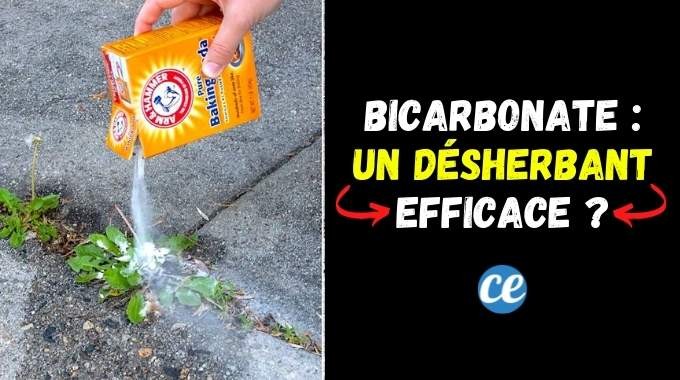
Is baking soda really an effective natural weed killer?
Baking soda is already renowned for its amazing uses in the garden.
It is in particular an excellent natural fungicide, and an excellent deodorizer for your compost.
For it to be effective in the garden, it is essential to know how to use it correctly, and the right dosage to respect.
So, can you really use baking soda to get rid of weeds?
Here is how to weed your garden naturally with baking soda . Watch:
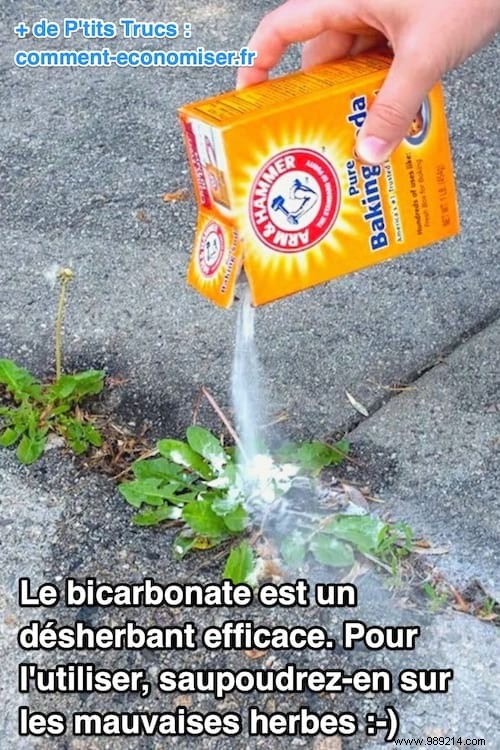
1. Take your box of baking soda.
2. Sprinkle the baking soda directly on the weeds.
3. Try to thoroughly cover all parts of the weed, including its stems and foliage.
4. After a few days, the weeds will change color and turn brown or black.
5. Simply pull out the weeds by hand or with a shovel.
6. To eliminate weeds in the paths or on your terrace, put the powder directly in the interstices.

Baking soda kills weeds by absorbing water from their cells.
This action causes the foliage of the weeds to gradually dry out.
Scientifically speaking, baking soda is what is known as a phytotoxic substance.
That is, it harms the growth of plants.
Thanks to its properties, it can therefore be used to kill weeds in the garden and on lawns.
- Bicarbonate is particularly effective on young shoots and tender weeds. On the other hand, it has difficulty eliminating large weeds, which have reached maturity.
- Bicarbonate works best beginning of the day , when the weeds are more active and their pores are open.
- The herbicidal properties of bicarbonate increase when temperatures exceed 30°C .
- If it has not rained for more than a week after an application of baking soda, water the weeds with 1 to 3 cm of water. This will diffuse the baking soda to the roots and help kill the weeds more effectively.
- To eliminate weeds effectively with baking soda, make several applications and sprays.
- When weeds, such as ground ivy, are exposed to excess salinity, they lose water and die.
The problem with trying to eliminate weeds is that they grow back!
This is by far the most frustrating part of weeding…
You eliminate a whole colony of weeds on your lawn.
And a few days later you already find yourself with another army of weeds invading your garden.
If you are looking for a long-lasting and effective weed control method, baking soda is the best solution .
With the right dosage and the right method of application, you always get good results.
The baking soda is so powerful that it can even kill surrounding plants, if they weren't protected during the baking soda spray.
But don't forget:for it to work, you have to be consistent!
Keep an eye on your garden and apply as needed.
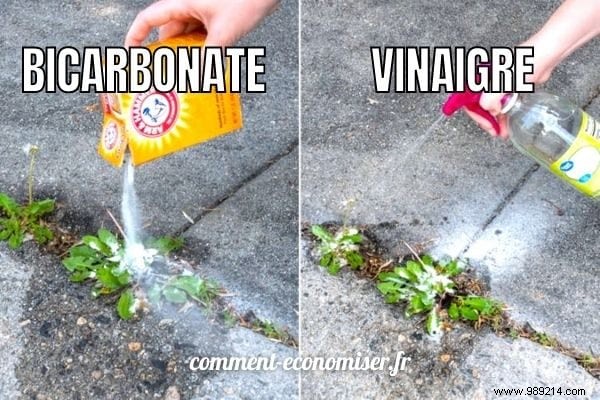
The acetic acid found in white vinegar kills most weeds, including dandelions.
Acetic acid has a corrosive action on plants .
It destroys the protective membrane on the leaves and all aerial parts of the plant.
This causes the plant tissues to dehydrate and prevent them from continuing photosynthesis.
Vinegar is also a 100% natural product. , making it an environmentally friendly weed killer.
Vinegar is obtained by fermentation of apples, grapes or cereals.
Apple cider vinegar, made from fermented apple juice, is particularly effective at killing weeds.
By combining the herbicidal properties of apple cider vinegar and baking soda, you get a powerful, effective and 100% natural weedkiller .
The mixture can be sprayed in liquid form or applied as a paste.
It's up to you to choose the shape that suits you best.
But be aware that both methods are equally effective. Watch:
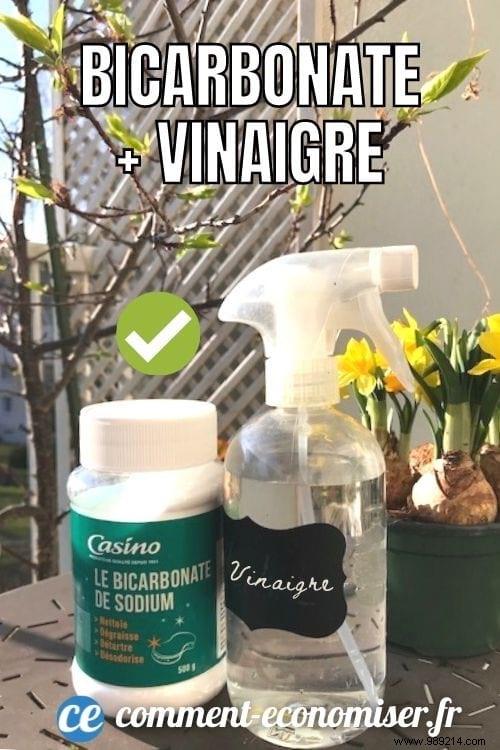
- 1 part baking soda
- 2 volumes of white vinegar
- spray bottle
1. First put the baking soda in the spray bottle, and then put the vinegar.
2. Let the mixture foam for about 1 minute before putting the nozzle back on the spray bottle.
3. Spray the mixture on the weeds. Shake the spray bottle before each use.
4. You can also sprinkle the baking soda directly on the weeds, then spray them with vinegar.
It is also possible to prepare a paste by mixing baking soda with vinegar.
Apply this paste in the gaps between the tiles paths and terraces.
It is in these places where weeds with deep roots are often found.
1. Mix the ingredients in a bowl:one part baking soda to two parts vinegar (preferably cider vinegar).
2. Better to use a large bowl, so that the mixture does not overflow when it foams.
3. Wait for the mixture to finish foaming, mix again until you get a paste texture.
4. Apply this paste in the cracks or at the foot of the weeds.
5. Repeat these steps every other day, until all the weeds are gone. Once the weeds have been eliminated, rinse off the residue of the paste with a garden hose.
Warning: the bicarbonate + vinegar mixture is so powerful that it can harm the fertility of the soil. In too large quantities, it can therefore prevent plants from growing back there!
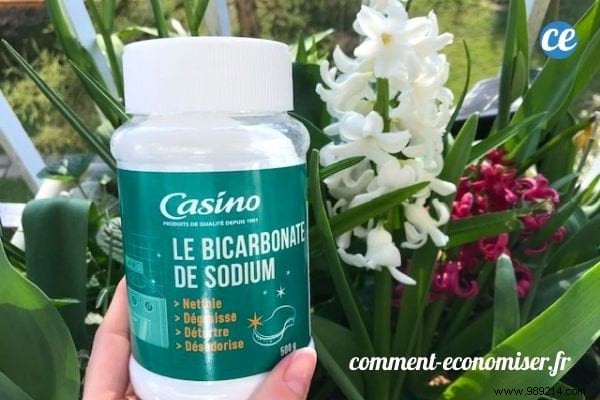
Like most biological weed killers, baking soda is a non-selective contact herbicide.
In other words, baking soda kills the surface tissues of the plant with which it comes into contact.
This means baking soda doesn't just kill weeds…
More than that, it kills EVERY plant it comes in contact with!
Including desirable plants, like your flowers and the grass that grows in your garden.
Unlike commercial weedkillers, baking soda is very easy to use, inexpensive and often at hand!
It is also SAFE for your family.
Most other weed killers contain dangerous chemicals, which are harmful to the garden, family and pets.
You can still weed by hand or with a weeder, like this one.
But this method is often long and difficult, especially if the area to be weeded is large.
Here are some other precautions to take:
- Always do a test on a small area of weeds, to determine if this is the most suitable solution.
- Cover and protect your other plants when you make applications, whether it is the baking soda + vinegar mixture or baking soda alone.
- Did you use too much baking soda in your garden? Simply rinse the treated area with plenty of water. You can then repeat the application with the appropriate dosage.
- Avoid using baking soda in littoral areas , where there is a high level of salt in the soil.
- It is recommended to wear a surgical mask when mixing baking soda and vinegar. Indeed, the chemical reaction can sometimes give off an unpleasant odor.
Unfortunately, far too many people are unaware of how effective home remedies are.
Too often, people have the reflex to buy commercial products full of chemicals.
These industrial products may be effective, but they are also polluting!
It's a shame!
Indeed, grandmother's tips and remedies are often more effective than industrial products full of toxic substances.
And in addition, the homemade tips are easy to prepare, safe for your family and above all 100% natural.
So here's a little advice.
Before buying a chemical weedkiller to kill weeds, look in your kitchen cupboard .
You will certainly find all the products you need to make a natural weed killer.